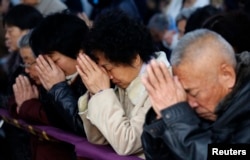Another church has been ordered to close in China in a sign that authorities are continuing a crackdown against unregistered congregations.
This week police raided Huoshi Church, the largest unregistered church in Guiyang, Guizhou province and ordered it to shut down.
Lead pastor Su Tianfu Su told VOA the church is officially closed as of Thursday.
“Most of our congregation was very upset," Su said. "We feel we’re a faithful group, which has done nothing but a lot of charitable work in Guiyang by reaching out to those in need including orphans and the sick and the elderly.”
Su said he plans to seek legal help to overturn the closure and said he believes his congregation will remain faithful although many of them have long been threatened not to attend any services here.
The latest police action started Wednesday, when dozens of police officers raided morning services where nearly 200 members had gathered for a fasting and prayer session. Church members who spoke to VOA but asked their names be withheld, said police searched the church and confiscated equipment, including stereo and surveillance camera systems without a court-issued warrant.
One of the church pastors, Yang Hua, was arrested after he refused to let the police walk away with the church’s surveillance footage, pastor Su said, adding another church-goer, Yu Lei, was later taken away on charges of “leaking secret documents.”
‘Anti-cult’ campaign targets Christians
China's “house church” movement has largely been tolerated by the government for years, and an estimated millions of Chinese are members of such underground churches. But authorities have started to crack down on the groups as part of an “anti-cult” campaign.
Estimates of the size of China's Christian population vary, but some believe it is larger than the country's nearly 88-million-strong Communist Party. That is why Beijing's critics believe churches have come under such scrutiny. They say Beijing’s opposition to house churches arises more out of fear of potential threat to orderly society from mass mobilization of believers, similar to the 1989 Tiananmen Square protests or the 1999 mass protests staged by Falun Gong members. Beijing mostly allows registered or official assemblies of Christians, which operate under government-run affiliations.
Members of the Houshi Church suspect their congregation drew police attention because of its rapid growth from dozens of members in 2009, to more than 700 now.
“Firstly, our quick expansion. Secondly, we refused to cave into pressure or join the [party-controlled] Three-Self Patriotic Church. And thirdly, we always take legal action in face of difficulties. I think these three aspects have annoyed [officials] very much,” a church source told VOA.
The Houshi churches' accountant, Zhang Xiuhong, was detained in late July on charges of running an “illegal business operation” for helping to pay the down payment on the church's $778,000 property. Authorities also froze its two bank accounts, making it impossible to pay its mortgage.
In late November, officials told lead pastor Su Tianfu that the church’s use of an office building for religious gatherings violated the city’s planning laws and would thus be liable for a daily fine of $2,023.
Accusations of political agenda
Church supporters say a leaked confidential government document dated December 3, 2015 reveal the motivations behind the crackdown on the Houshi church.
The document stated that the campaign was a “political mission,” aimed to dissolve an “illegal and reactionary organization.” Church members insist they have been transparent in their congregation's finances, organizational development and public gatherings.
Although freedom of religion is enshrined in China's constitution, Hans Stockton, director of the Center for International Studies at the University of St. Thomas, argued that, in practice, the Communist Party has a poor record of preserving religious freedom.
“The freedom to follow one’s faith is an individual choice and that form of individual liberty is not part of the Communist Party’s vision of China’s future,” the professor said.
Following Wednesday's arrests in Guizhou province, China Aide, a non-profit Christian human rights group, is calling for officials to look into the prosecutions.
“We call upon the Chinese leaders to immediately halt this barbaric campaign and hold those abusive government leaders accountable,” Bob Fu, the group’s U.S.-based founder, said in an emailed reply to VOA.
Broader crackdown
The crackdown on Huoshi Church follows the high-profile campaign in Zhejiang province to demolish thousands of crosses from 400 churches.
Lawyers who had helped churches try to oppose the demolitions have also faced prosecution.
Thirty-seven-year-old rights lawyer Zhang Kai and his assistant, Liu Peng, have been under residential surveillance in Inner Mongolia since late August. Zhang Kai had organized a 30-member lawyers’ group to defend the Zhejiang churches.
Both face charges of “assembling crowds to disrupt social orders” and “leaking national secrets to foreign organizations,” and have since been denied of access to their lawyers.
“Based on our interviews, church members said Zhang and his assistant did nothing but offer legal consultation, training and advice about possible judicial remedies for infringement of rights by the state. None of those should be illegal,” said Liu’s lawyer, Li Boguang.
In view of the arrest of lawyers, Stockton criticized that the rule of law in China has seriously shifted.
“When lawyers who take up such cases are also, in a way, found guilty by association, this is a concern to any perception of rule of law and justice in China,” Stockton said.





